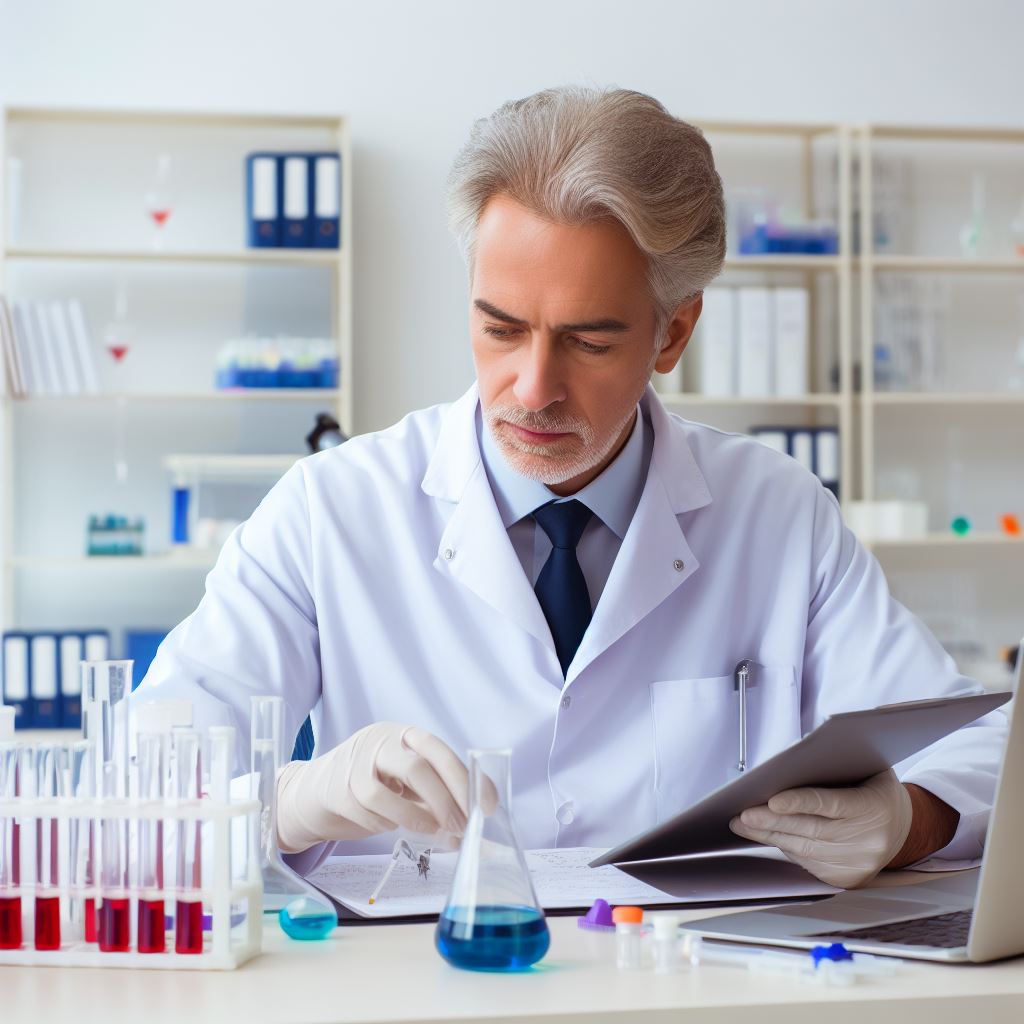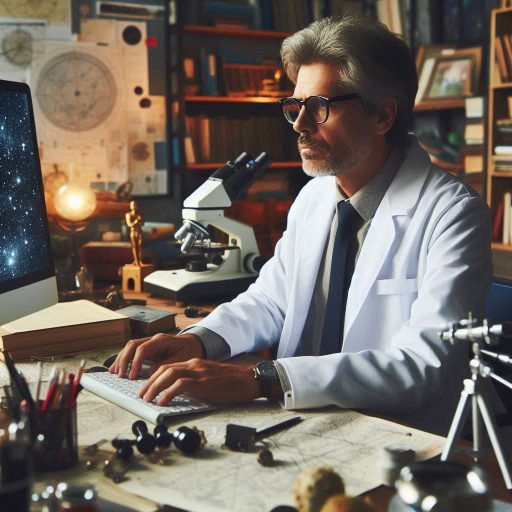Introduction
The chemist profession in the US
Chemists play a crucial role in the United States, employing their expertise in analyzing and synthesizing substances for various industries.
This blog will delve into how technology has influenced this profession, paving the way for new advancements and challenges.
Modern society heavily relies on technology in numerous fields, including healthcare, agriculture, and manufacturing.
The chemist profession is no exception, as technology has become an integral part of their work.
Impact of technology on this profession
Technology has drastically enhanced the speed and accuracy of experiments, enabling chemists to conduct research more efficiently.
Automated processes and high-throughput screening techniques have revolutionized the way chemists analyze samples and collect data.
Moreover, advancements in analytical instruments have made it possible to detect and characterize molecules with incredible precision.
Sophisticated techniques such as mass spectrometry and nuclear magnetic resonance have become common tools in the chemist’s arsenal.
Furthermore, technology has expanded the possibilities for collaboration and knowledge sharing among chemists.
Online platforms and databases have made it easier to access and exchange information, facilitating global cooperation in scientific research.
The importance of technology in various fields
However, technology also presents challenges for chemists. The rapid rate at which new technologies emerge requires chemists to constantly update their skills and adapt to new methodologies.
Additionally, the increasing reliance on automation raises concerns about job security in some areas of the profession.
In general, technology has undoubtedly revolutionized the chemist profession in the United States. It has accelerated research processes, improved accuracy, and fostered global collaboration.
Nonetheless, chemists must continue to embrace technological advancements to stay relevant in an ever-evolving field.
Role of Technology in the Chemist Profession
Advancements in laboratory equipment and instruments have transformed the way chemists work. Automation and robotics in chemical analysis, synthesis, and sample processing
Advancements in laboratory equipment and instruments have transformed the way chemists work
The field of chemistry has undergone significant changes over the years due to advancements in technology.
These technological innovations have revolutionized the way chemists work and have greatly impacted the profession in the United States.
One of the most notable changes in the chemistry profession is the advancements in laboratory equipment and instruments.
These advancements have not only made the work of chemists more efficient but have also enabled them to conduct experiments and analyze results in a much faster and more accurate manner.
The introduction of automated systems has reduced the need for manual handling and has improved the reproducibility of experiments.
Automation and robotics in chemical analysis, synthesis, and sample processing
Automation and robotics have also played a crucial role in chemical analysis, synthesis, and sample processing.
Automated systems can perform repetitive tasks with high precision, reducing the chances of human error and increasing overall productivity.
These systems are capable of handling a wide range of chemical reactions and can carry out complex synthesis processes efficiently.
Artificial intelligence (AI) in predicting chemical reactions and designing new drugs
The use of artificial intelligence (AI) has become increasingly prevalent in the chemist profession.
AI algorithms can analyze vast amounts of data and make predictions about chemical reactions and properties with high accuracy.
This has been particularly useful in drug discovery, where AI is used to predict the potential efficacy and safety of new drugs before they are synthesized and tested.
The use of AI has significantly accelerated the drug discovery process and has led to the development of more effective and targeted drugs.
High-throughput screening techniques
Another significant impact of technology on the chemist profession is the introduction of high-throughput screening techniques.
These techniques allow chemists to rapidly test thousands of chemical compounds for their biological activity, which is particularly valuable in drug discovery and development.
High-throughput screening has increased the efficiency of the screening process and has enabled chemists to identify potential drug candidates more quickly.
Expansion of computational chemistry and molecular modeling
Furthermore, the expansion of computational chemistry and molecular modeling has transformed the way chemists understand and predict chemical reactions and properties.
Computational methods help chemists simulate and analyze complex chemical systems, allowing them to design new molecules with specific properties and functionalities.
This has accelerated the development of new materials, drugs, and catalysts.
In addition, technology has had a profound impact on the chemist profession in the United States.
Advancements in laboratory equipment, automation, artificial intelligence, high-throughput screening, and computational chemistry.
These have revolutionized the way chemists work and have significantly accelerated the pace of scientific discovery and innovation.
As technology continues to evolve, it is expected to further enhance the capabilities of chemists and lead to exciting advancements in the field of chemistry.
Read: Top Chemistry Departments and Schools in the US
Increased Efficiency and Accuracy
Technology has had a profound impact on the chemist profession in the US, leading to increased efficiency and accuracy in various aspects of their work.
These advancements have revolutionized the field, allowing chemists to perform their tasks more effectively and with greater precision.
Efficiency improvements through automated processes
One of the most significant benefits of technology in the chemist profession is the introduction of automated processes.
These automated systems have streamlined various tasks, reducing the need for manual labor and saving significant amounts of time.
Chemists can now rely on machines and instruments to perform repetitive tasks, freeing up their time for more complex and intellectually stimulating work.
Enhanced accuracy in analyzing complex chemical structures and reactions
Technology has provided chemists with advanced tools and software that enable them to analyze complex chemical structures and reactions with a higher level of accuracy.
Sophisticated software programs can now handle large amounts of data and perform intricate calculations that would have been almost impossible to accomplish manually.
This has led to a deeper understanding of chemical processes and the ability to make more precise predictions.
Reduction of human errors in data collection and analysis
Human errors are an inevitable part of scientific research, but technology has helped minimize their impact..
With the use of automated data collection systems and analytical instruments, chemists can now collect and analyze data with minimal human intervention.
This has significantly reduced the chances of errors in data recording and interpretation, ensuring more reliable and trustworthy results.
Transform Your Career Today
Unlock a personalized career strategy that drives real results. Get tailored advice and a roadmap designed just for you.
Start NowImproved reproducibility and reliability of results
Reproducibility is a fundamental principle of scientific research. Technology has played a crucial role in improving the reproducibility and reliability of experimental results in the chemist profession.
Automated systems and advanced laboratory equipment ensure consistent conditions and procedures, eliminating the variability that could arise from manual handling.
This allows other researchers to reproduce and verify findings, contributing to the overall advancement of scientific knowledge.
In general, technology has had a profound impact on the chemist profession in the US, leading to increased efficiency and accuracy in various aspects of their work.
Through automated processes, chemists have experienced efficiency improvements, reducing manual labor and saving time.
Enhanced accuracy in analyzing complex chemical structures and reactions has been made possible by advanced tools and software.
The reduction of human errors in data collection and analysis has increased the reliability of results.
Lastly, technology has improved the reproducibility and reliability of experimental findings, ultimately benefiting scientific research as a whole.
Read: Earning Potential: Chemist Salaries Across US States

Expanded Research Avenues
Access to vast databases and online resources for literature research
Technology has revolutionized the way chemists conduct literature research by providing access to a vast amount of databases and online resources.
This allows chemists to explore a wide range of scientific publications, including journals, articles, and books, all at their fingertips.
Increased collaboration through online platforms and virtual conferences
The advancement of technology has made it possible for chemists to collaborate with professionals from all over the world, regardless of geographic barriers.
Online platforms and virtual conferences facilitate real-time discussions, sharing of ideas, and joint research projects, leading to groundbreaking discoveries.
Integration of big data analysis in chemical research
The advent of big data has transformed the way chemists analyze and interpret research data.
By employing advanced computational techniques, chemists can quickly process large datasets, identify patterns, and draw meaningful conclusions.
This integration has opened up new possibilities for innovation and discovery.
Development of new research methodologies facilitated by technological advancements
Technological advancements have played a pivotal role in the development of new research methodologies in chemistry.
From automation and robotics to spectroscopy techniques, technology has enabled chemists to conduct experiments more efficiently, accurately, and on a larger scale.
This has significantly accelerated the pace of scientific progress.
Overall, the impact of technology on the chemist profession in the US has been profound. It has expanded research avenues by providing access to vast databases and online resources for literature research.
The ability to collaborate with professionals globally through online platforms and virtual conferences has led to increased innovation and breakthroughs.
Integration of big data analysis has transformed the way chemists analyze research data, leading to more accurate and insightful results.
Moreover, technological advancements have facilitated the development of new research methodologies, enabling chemists to conduct experiments more efficiently and on a larger scale.
In closing, technology has revolutionized the field of chemistry, offering endless possibilities for research and discovery.
It has enhanced the accessibility of knowledge, fostered global collaboration, and empowered chemists to make significant contributions to scientific advancements.
As technology continues to evolve, the chemist profession will continue to benefit from its ongoing integration, remaining at the forefront of innovation and progress.
Read: Key Roles and Responsibilities of a Chemist in the US
Explore Further: Career Transition: From Zoology Student to Professional
Learn More: Optometry in Rural vs. Urban Areas: Differences and Needs
Challenges and Adaptation
Need for continuous learning and keeping up with evolving technologies
The profession of chemistry in the US is witnessing a rapid transformation due to advancements in technology. As a result, chemists are facing several challenges in adapting to the changing landscape.
One primary challenge is the need for continuous learning. With new technologies emerging regularly, chemists must stay updated with the latest developments to remain relevant in their field.
This requires a commitment to lifelong learning and professional development.
Balancing between traditional laboratory skills and adopting new technologies
Chemists often find themselves in a dilemma of balancing their traditional laboratory skills with the adoption of new technologies.
While traditional skills form the foundation of their expertise, they must also embrace modern techniques to enhance efficiency and productivity.
The integration of technology in various processes has become inevitable, requiring chemists to become proficient in handling sophisticated instruments and software.
This transition may be challenging initially, but it is essential to leverage the benefits of automation and data analysis.
Ethical considerations in the use of AI and machine learning techniques
The use of artificial intelligence (AI) and machine learning techniques in the field of chemistry brings both opportunities and ethical dilemmas.
While these technologies offer enhanced accuracy and efficiency, chemists must navigate ethical considerations associated with data privacy, biases, and potential misuse.
Ethical guidelines and regulations need to be established to ensure responsible use of AI and machine learning in chemistry.
Chemists play a vital role in promoting ethical practices and being proactive in addressing the societal implications of their work.
Impact on employment and job market for chemists
The widespread adoption of technology in the chemical industry has an undeniable impact on employment and the job market for chemists.
Automation and digitalization have resulted in the elimination of certain routine laboratory tasks, leading to a shift in job requirements.
Showcase Your Business Today
Reach thousands of readers actively exploring professional services. Publish your business profile and grow your audience now.
Publish NowChemists need to adapt to this changing landscape by acquiring additional skills and expertise in areas such as data analysis, process optimization, and instrument maintenance.
By embracing technology and upskilling, chemists can remain competitive in the job market and explore new career opportunities.
In summary, technology has both created challenges and opportunities for the chemistry profession in the US. Continuous learning.
Striking a balance between traditional and modern skills, addressing ethical considerations, and adapting to the evolving job market are essential for chemists to thrive in this technological era.
Embracing these challenges and adapting to new technologies will ultimately drive innovation and advancement in the field of chemistry.
Read: Comparing Industrial vs. Academic Chemist Careers in the US
Conclusion
Technology has undeniably revolutionized the chemistry profession in the US, bringing about significant changes.
The impact of technology in this field cannot be overstated. It has enhanced research capabilities, streamlined processes, and increased efficiency.
Continued advancements in technology will be pivotal for the growth and success of chemists in the future.
It is crucial for professionals in this field to stay updated with the latest technological developments.
By embracing new technologies, chemists can stay ahead of the curve, and further improve their research and analysis techniques.
Ultimately, technology has transformed the chemist profession, making it more dynamic and progressive.
As technology continues to evolve, it is essential for chemists to remain adaptable and open-minded towards new advancements.
By doing so, they can continue to make significant contributions to the field, and achieve success in their careers.
[E-Books for Sale]
The Big Book of 500 High-Paying Jobs in America: Unlock Your Earning Potential
$19.99 • 500 High-Paying Jobs • 330 pages
Explore 500 high-paying jobs in America and learn how to boost your career, earn more, and achieve success!
See All 500 High-Paying Jobs of this E-Book
1001 Professions Without a Degree: High-Paying American Jobs You Can Start Now
$19.99 • 1001 Professions Without a Degree • 174 pages
Discover 1001 high-paying jobs without a degree! Unlock career tips, skills, and success strategies for just $19.99!




